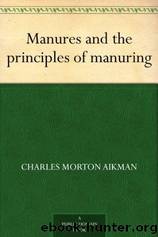Manures and the principles of manuring by Charles Morton Aikman

Author:Charles Morton Aikman [Aikman, Charles Morton]
Language: eng
Format: epub
Google: hSZIAAAAIAAJ
Publisher: Blackwood
Published: 1894-01-15T05:33:53+00:00
I.âNitrogenous Guanos.
(a) Peruvian.
By far the most valuable and abundant deposits as yet discovered have been those on the Peruvian and Chilian coasts. As already pointed out, guano seems to have been used in this country from a very early period; and so impressed were the Incas with its importance as a manure, that the penalty of death was imposed on any one guilty of killing the sea-fowl during the breeding season in the vicinity of the deposits.
The occurrence of guano in Peru seems first to have been made known in Europe in the beginning of the eighteenth century. It was not, however, till the beginning of the present centuryâviz., 1804âthat A. Humboldt, the great German traveller, brought some of the wonderful fertiliser home with him, and that its composition was able to be investigated by chemical analysis. Shortly afterwards, its practical value was demonstrated by experiments carried out on potatoes by General Beatson in St Helena. To Lord Derby is due the credit of having first introduced it into this country, the earliest importation into Liverpool being in 1840. Experiments were shortly afterwards instituted in different parts of the country, prominent among which were those by Sir John Lawes and Sir James Caird; and so striking were the results obtained, that the manure rapidly found favour with the farming communityâso much so, that ten years later the importations into this country amounted to no less than 200,000 tons, while in 1855 the total exports from the west coast of South America reached the enormous amount of 400,000 tons. In all, it has been estimated that since the year 1840 over 5,000,000 tons of Peruvian guano have been imported into this country.
Download
This site does not store any files on its server. We only index and link to content provided by other sites. Please contact the content providers to delete copyright contents if any and email us, we'll remove relevant links or contents immediately.
The Permaculture Way by Graham Bell(589)
The Permaculture Garden by Graham Bell(515)
People & Permaculture by Looby Macnamara(435)
The Complete Guide to GROWING YOUR HOPS, MALTS, AND BREWING HERBS: EVERYTHING You Need to Know Explained Simply by John Peragine(403)
The New Seed-Starters Handbook by Nancy Bubel & Jean Nick(380)
GMOs Decoded by Sheldon Krimsky(336)
Sowing Seeds of Change: Informing Public Policy in the Economic Research Service of USDA by Panel to Study the Research Program of the Economic Research Service(188)
The Stewardship of the Soil by John H. (John Henry) Worst(31)
Manures and the principles of manuring by Charles Morton Aikman(28)
Diffusion and transfer of knowledge in agriculture by Christian Huyghe Pascal Bergeret Uno Svedin(22)
Right Use of Lime in Soil Improvement by Alva Agee(21)
